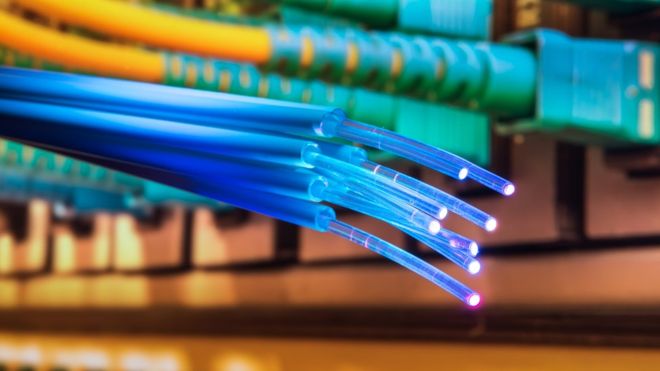Researchers in Australia claim they have recorded the fastest ever internet data speed.
A team from Monash, Swinburne and RMIT universities logged a data speed of 44.2 terabits per second (Tbps).
At that speed, users could download more than 1,000 high-definition movies in less than a second.
According to Ofcom, the average UK broadband speed currently is around 64 megabits per second (Mbps) - a fraction of that recorded in the recent study.
Australia lies in the middle of global rankings for internet speeds, and slow connections are a regular source of complaints from users.
Researchers said they achieved the new record speed by using a device that replaces around 80 lasers found in some existing telecoms hardware, with a single piece of equipment known as a 'micro-comb'.
The micro-comb was planted into and tested - outside the laboratory - using existing infrastructure, similar to that used by Australia's National Broadband Network (NBN).
The result was the highest amount of data ever produced by a single optical chip, which are used in modern fibre-optic broadband systems around the world.
The Australian team hope their findings offer a glimpse into how internet connections could look in the future.
While the data speed far outstrips any reasonable consumer need in today's world, Bill Corcoran, lecturer in electrical and computer systems at Monash University, said it could ultimately help transform a wide variety of industries - as modern life continues to put increasing pressure on bandwidth infrastructure.
'Enormous breakthrough'
The global lockdown measures imposed during the coronavirus pandemic has seen the internet infrastructure come under unprecedented strain.
"We're currently getting a sneak peek of how the infrastructure for the internet will hold up in two to three years' time, due to the unprecedented number of people using the internet for remote work, socialising and streaming," said Mr Corcoran.
"What our research demonstrates is the ability for fibres that we already have in the ground... to be the backbone of communications networks now and in the future."
"And it's not just Netflix we're talking about here," he added. "This data can be used for self-driving cars and future transportation, and it can help the medicine, education, finance, and e-commerce industries - as well as enable us to read with our grandchildren from kilometres away."
Professor David Moss, of Swinburne University, described the findings as "an enormous breakthrough".
"Micro-combs offer enormous promise for us to meet the world's insatiable demand for bandwidth."
Latest Stories
-
Ursula Owusu-Ekuful’s projects in Ablekuma West constituency
8 mins -
Why has South Korea’s president suddenly declared martial law?
10 mins -
National Cathedral: We don’t manage public funds with the bible – Domelevo
27 mins -
CHAG commissions SafeCare Hub to transform healthcare delivery in Ghana
32 mins -
Hold my bissap: On marriage, dating, and the single sage
40 mins -
All that glitters is not gold – Damien D. Smith on finances of Hollywood stars
45 mins -
Blackout Concert: Lyrical Joe billed for Korley Black’s event in Somanya
1 hour -
Interior Minister warns against violence in Bawku ahead of elections
1 hour -
Holders of restructured debts to receive their monies in 2 years – Dr. Amin Adam
1 hour -
I could’ve transformed Ghana to Dubai with the borrowed $11.5bn – Mahama to Ofori-Atta
1 hour -
Vice President Bawumia commissions E-Gates at Kotoka International Airport
2 hours -
Young Rob wins Best Collaboration Video at RBE Awards 2024
2 hours -
Hundreds demonstrate in Elmina to demand the return of GN Bank
2 hours -
Attorney General urges African nations to strengthen legal systems to prevent ICC intervention
2 hours -
Revisit underutilised and neglected indigenous foods – Health researcher
2 hours

